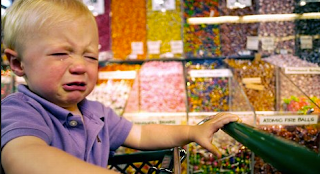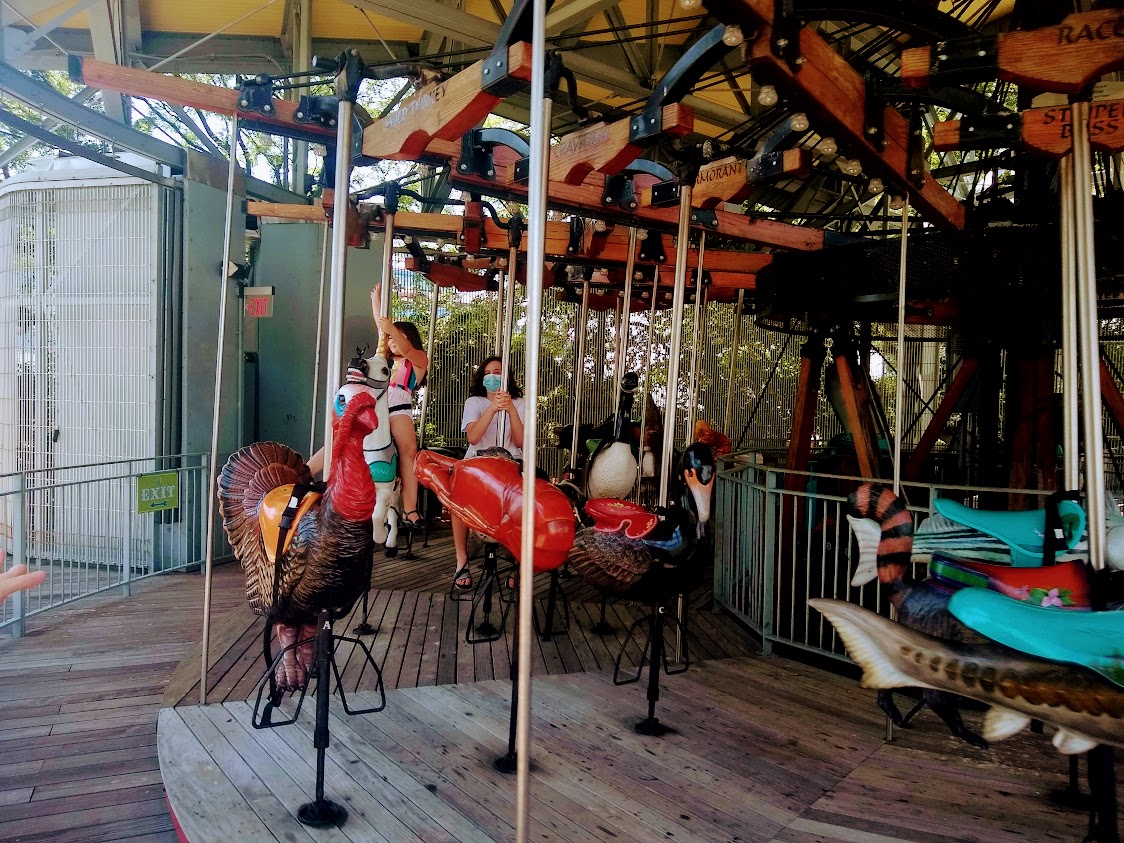Who gets served?
My physics professor friends sent this link along: Are Today's Parents Getting a Raw Deal? As in Susan Greenfield's article about having it all, these concerns inhere to a privileged class, but lots I agree with in her post. Really, as Rhonda Stephens explains in the post, in many ways it's the spoiled kids getting the raw deal, missing out on the chance to learn coping skills, delayed gratification, independence, endurance, and I would add, appreciation for what they have.
Everything is over the top now. We went to a charming, small-town St. Patrick's Day parade and the people in the parade hurled candy at the watchers the entire time. At first I thought it was a lollipop here or there, which seemed okay, but no, the kids came home with giant bags of candy, like Halloween. If that's St. Patrick's Day, what does that do to Halloween? And what does that do to the kid the next time he watches a candy-less parade? All he'll be thinking is: Where's the candy?
People shower the kids with gifts now, too. Multiple gifts for holidays, including holidays that never used to be associated with giving gifts. Random gifts just on any given day. Our babysitter brought a brand new pink plastic doll house for Petra a few weeks back. I was so frustrated (so was Wally, who didn't get a gift -- but now that I think about it, maybe that was a more valuable lesson), but I was frustrated because I have been saving in the closet the beautiful, only slightly graphittied wooden dollhouse my parents gave my nieces a few years ago and now my nieces are passing along to Petra. Now, how can the stowed way, handed down, slightly-graphittied wooden dollhouse possibly have the same effect?
Do I sounds like a whiny, spoiled or maybe even curmudgeonly parent to even raise these concerns? Woe is me! My kids get too many toys! Holidays are too much fun! Too many people love my kids and shower them with presents! Yes maybe I am whining and spoiled wanting, in my own nonmaterial and non-materialist terms, the ideal childhood experience for my kids. But that doesn't negate the fact that there is a real price of all this consumerism and consuming. And that our kids are the ones who have to pay it. That's the real point, not that the parents are getting the raw deal, but that the kids are.
Even my mom, who so generously buys Easter candy and stuffs a million eggs, buys too much. There are always so many eggs per kids, with tons of unstuffed candy left over. Profligate. Simple supply-and-demand economic principles expose the real cost of too much: How can any single egg have the value that it would previously have had? They're not just missing out on lessons in grit, but they're missing out on the joy of having something you really want, or even of wanting something you never get. There is a distinct lack of joy that attends this embarrassment of riches, epitomized by the spoiled child stamping his or her foot, crossing her arms, surrounded by mountains and mountains toys.
Many more examples I would like to give of kids being over-indulged, more processing of this raw data I would like to do, but I can't now, so I'll just shoot this out there:
Someone in favor of all the too-much-ness of everything, the literal spoiling of our children, can you tell me what it is you think they gain from having everything they think they want? If the parents are getting the raw deal, and the kids are missing out on the chance to learn an essential lesson about real life best summarized by the Rolling Stones, and the kids are missing out on the chance to really enjoy things if the only ones really gaining are those making money off the endless, colossally decadent consumption, I think we should ask ourselves: Who gets served?
Everything is over the top now. We went to a charming, small-town St. Patrick's Day parade and the people in the parade hurled candy at the watchers the entire time. At first I thought it was a lollipop here or there, which seemed okay, but no, the kids came home with giant bags of candy, like Halloween. If that's St. Patrick's Day, what does that do to Halloween? And what does that do to the kid the next time he watches a candy-less parade? All he'll be thinking is: Where's the candy?
People shower the kids with gifts now, too. Multiple gifts for holidays, including holidays that never used to be associated with giving gifts. Random gifts just on any given day. Our babysitter brought a brand new pink plastic doll house for Petra a few weeks back. I was so frustrated (so was Wally, who didn't get a gift -- but now that I think about it, maybe that was a more valuable lesson), but I was frustrated because I have been saving in the closet the beautiful, only slightly graphittied wooden dollhouse my parents gave my nieces a few years ago and now my nieces are passing along to Petra. Now, how can the stowed way, handed down, slightly-graphittied wooden dollhouse possibly have the same effect?
Do I sounds like a whiny, spoiled or maybe even curmudgeonly parent to even raise these concerns? Woe is me! My kids get too many toys! Holidays are too much fun! Too many people love my kids and shower them with presents! Yes maybe I am whining and spoiled wanting, in my own nonmaterial and non-materialist terms, the ideal childhood experience for my kids. But that doesn't negate the fact that there is a real price of all this consumerism and consuming. And that our kids are the ones who have to pay it. That's the real point, not that the parents are getting the raw deal, but that the kids are.
Even my mom, who so generously buys Easter candy and stuffs a million eggs, buys too much. There are always so many eggs per kids, with tons of unstuffed candy left over. Profligate. Simple supply-and-demand economic principles expose the real cost of too much: How can any single egg have the value that it would previously have had? They're not just missing out on lessons in grit, but they're missing out on the joy of having something you really want, or even of wanting something you never get. There is a distinct lack of joy that attends this embarrassment of riches, epitomized by the spoiled child stamping his or her foot, crossing her arms, surrounded by mountains and mountains toys.
Many more examples I would like to give of kids being over-indulged, more processing of this raw data I would like to do, but I can't now, so I'll just shoot this out there:
Someone in favor of all the too-much-ness of everything, the literal spoiling of our children, can you tell me what it is you think they gain from having everything they think they want? If the parents are getting the raw deal, and the kids are missing out on the chance to learn an essential lesson about real life best summarized by the Rolling Stones, and the kids are missing out on the chance to really enjoy things if the only ones really gaining are those making money off the endless, colossally decadent consumption, I think we should ask ourselves: Who gets served?



Two great points—growing up expecting to get everything you want (and how is this related to the millennials' oft-noted sense of entitlement) and the joy-robbing. The issue for parents financially fortunate enough to have this problem is how to stop it, since people, including kids, tend to compare themselves to their immediate reference group. For those kids having this embarrassment of riches, chances are that most of their friends do too. This means the parents, if they want to set boundaries, have to figure out how to stop the onslaught of gifts, etc. from friends and relatives AND explain to their kids why they are treated so differently (and in the child's eyes, worse) than their reference group.
ReplyDeleteHawkeye's back!
ReplyDeleteThis morning I thought of a policy solution - tax on toys and kid's activities to promote social welfare programs! Seriously! The rich kids need less. The poor kids need more!
ReplyDeleteThe other issue is what to do with your time if you are not 'over-scheduled'. This blog is talking about how parents were selfish, had lots of chores for kids. This is in diametrically opposed (in my mind) against the idea of protecting your kids by being over-scheduled by having lots of free play. Should kids be left to their own devices to do what they want? Or, should an adult be telling them how to be helpful? Obviously, the extreme of factory work should not be repeated.
ReplyDeleteThanks Hawkeye & Eli...I've missed your voices! Hawkeye you're absolutely right it's not only a matter of curbing the onslaught from friends & relatives, but it's also helping the child understand the "deprivation" compared to peers. Anyone have any ideas?
ReplyDeleteEli - I love the policy solution - and it's so perfectly summarized - rich kids need less (stuff/activities) while poor kids need more. In a way the same problematic binary applies to regulation of education - assessments in some cases can serve poor districts (in other cases they're destructive, allowing private interests to shutter public schools) but in general they do not serve the rich schools with adequate resources to support students without significant oversight.
Good point that the blog I pointed to - Rhonda Stephens' - referred back to a time of incredible parental indulgence/neglect. I did not adequately address the nuance or implications of her discussion. One is keeping your kids tethered to their responsibilities/chores, etc., the other is protecting their time for free play, which in many ways has more in common with the over-scheduling model. Both overscheduling & protecting free time for play are about (ostensibly) doing what is best for the child. Is there reasonable middle ground? Agreed the extreme of factory work shouldn't be repeated (!!) but I think kids should help out a bit more than they do on average in the socio-economic groups we're talking about. As I'm writing...I'm mixing myself all up in terms of what constitutes over-indulging a child -- it could be letting him or her take all the activities he wants, buying all the toys he wants, but it can also manifest I think in the attachment parenting extreme which is not necessarily tied to spending money or enrolling in activities, but still revolves around the parent trying to please the child endlessly.
I remember as a young reader being touched by Laura Ingalls Wilder's description of the the profound wonder of a visitor arriving in a blizzard bearing one Christmas orange for each child... It is good to not give so much that humans learn to think and feel and say...is that all? The greatest gifts are generally ignored...
ReplyDeleteD always sang that Rolling Stones song to Eric...then Eric told Zoe about it...and now Zoe repeats it back to Eric :)
ReplyDeleteHi Jeanette - Thanks for reminding me about the orange-bearing blizzard visitor and how happy the girls were. That is incredibly true: the greatest gifts are generally ignored. Thanks for saying that. I'm going to try harder not to ignore them.
ReplyDeleteBearette - the song is perfect for kids - in fact there's a guy Randy Kaplan who does a fantastic version for kids.
https://www.youtube.com/watch?v=A78ZbxtPsbg
Funny you mention the St. Patrick's Day parade. We were at the opposite end of the green that day, and by the time the parade reached us, there was no candy left. Of course, I had no idea all this candy-tossing existed, but my nephews did, and they, along with many other children, were asking where the candy was.
ReplyDeleteAs a new parent in my late-thirties, as a minimalist and environmentalist, and as a member of the working class, I am perpetually surprised by our culture of over-consumption.
As we walked up to the parade, my sister-in-law began to panic because she'd forgotten her wallet and asked my parents if they had any cash on them. (They didn't.) Apparently, my nephews are conditioned to purchasing toys at parades.
Once at the parade, a different nephew--we are a big group--began having a meltdown. In an attempt to mitigate things, my sister purchased two plastic blow-up Ninja Turtles on sticks at $10 a pop (!!!) and gave them to meltdown nephew and his brother. It did not help the meltdown, and in fact, my nephews and their parents had to leave the parade early and walk home. As for the Ninja Turtles, one was flattened almost instantly; the other, ignored and reeking so strongly of toxic cheap plastic, it got shoved in a corner. All I could think was: waste. Waste of money, but more importantly, environmental waste.
Who sounds curmudgeonly now?
But my two-year old enjoyed the parade the same way I did as a child, excited by the crowd, the bagpipes and music and fire engine sirens, eager to see the marchers and colorful floats, waving to them as they passed. When she tired of the stimuli, she ran around the green, danced with a new friend. I wonder, will this simple enjoyment change as she gets older and becomes aware of her cousins’ parents purchasing toys from the strolling vendors? How do parents with different values and/or means navigate this?
It seems that parents have lost the ability to say no, to themselves and to their children. Maybe it’s the mega marketing culture we’re immersed in. Maybe it’s the disappearance of the 9-5 workday, parents trading time for stuff; I can’t be with you, but I can buy you something. But there is something else at play… that Jonses vibe, the need to prove your worth by constantly accumulating stuff.
As for who gets served, I’m with you, it’s not the kids. I have seen so many playrooms packed with toys, children overwhelmed by choice, burnt out before they begin. It’s a creativity-killer and a factor that can contribute to ADHD.
In the words of my friend’s 4-year old, after receiving an extravagant number of gifts on his birthday, “Mommy, I need a break from all my presents. All this stuff is making me tired.”
Sarah - none of this is funny - but I am laughing so hard at the flattened/reeking Ninja Turtles -- only because it captures the horror of the waste so perfectly. More soon...
ReplyDeleteSorry it took me so long to respond. Playrooms packed full of toys - there is one in our neighborhood. I've been fighting for years to clear it out - bring extra toys to Goodwill or whatnot, but I can never get anyone (or, more accurately enough people) to agree. Whenever I tell them that the kids are falling over the toys and can't even reach what they want or figure out what they want people say we need extras of each toy in case more than one kid wants one at the same time. So there are four lawn mowers, five strollers, etc. What about waiting for a turn? Or playing together with one toy?
ReplyDeleteNext year I'll know to go to the other end of the green for the parade (and hope my kids don't fixate on the lack of candy).
So happy to hear your 2-year-old soaked up the parade and enjoyed the day without toxic cheap plastic or a heaping sack of lollipops and jawbreakers. I think you make an excellent point - that parents have not only lost the ability to say no to their children, but also to themselves. They've lost the ability to withstand the discomfort of whining or meltdowns or disappointment. Parents trading time for stuff is definitely art of it, and I think you're right, the Jones vibe, too. I think some combination, intensified by intense marketing pressure, the way we're conditioned to see the experience as more real, or important, if it's stamped with a purchase.